Overview
- Description
- The Felix and Flory Van Beek papers consist of biographical materials, correspondence, diaries, a personal narrative, photographs, and printed materials documenting a German-Dutch couple, their thwarted efforts to escape Europe on the SS Simon Bolivar, their survival in hiding with two separate Dutch families, their liberation, their immigration to the United States, and the deaths of their family members in the Holocaust. Many documents are accompanied by Flory Van Beek's annotations.
Biographical materials primarily document Felix and Flory Van Beek and include certificates, correspondence, forms, and true and false identification papers documenting Felix and Flory Van Beek and their citizenship, status, resistance work, emigration, and employment. This series also includes a birth certificate for Felix Van Beek’s mother, a birth certificate for Flory Van Beek’s mother, a marriage certificate for Flory’s parents, and documents tracing Alijda Cohen’s deportation via Westerbork to Auschwitz and Flory’s attempts to trace her.
Wartime correspondence includes the last letters Alijda Cohen sent before her deportation to Poland and letters from Jette Levi. Postwar correspondence includes letters from the Brandsen and Hornsveld families who sheltered Felix and Flory, from a friend made during the Van Beeks’ recuperation in England following the sinking of the SS Simon Bolivar, from an acquaintance named Marian who refers to herself as Flory’s sister, from friends and family in the Netherlands, and with the Jewish Community in Rotterdam regarding financial support the Van Beeks provided.
A four part diary written by Felix Van Beek in hiding documents his experiences in hiding and the news he learned about the war’s progress from newspapers and a crystal radio.
Flory Van Beek’s personal narrative is written as a lecture and narrates her childhood in the Netherlands, the German occupation, her experiences in hiding with her husband, liberation, and her discovery of the fates of her family members.
Photographs depict Felix and Flory Van Beek, the Brandsen and Hornsveld families who hid them during the war, and Flory’s mother Alijda Cohen.
Printed materials consist of newspapers and clippings. The largest series of these were collected by Felix and Flory Van Beek during the war and document the occupation of the Netherlands and the progress of the war. Additional printed materials document the sinking of the SS Simon Bolivar after it hit a German mine, the German occupation of the Netherlands and the persecution of Jews, liberation, the Van Beeks and their relatives, and the Brandsen and Hornsveld families who hid Felix and Flory.
Admission tickets document liberation events and events celebrating Queen Wilhelmina and Queen Juliana of the Netherlands. Liberation cards feature celebratory poems by Ida‐Marie Kriesz. Ration tickets are for textiles and are accompanied by instructions. The collection also includes a poem written by Henriette Boas after hearing a BBC program featuring child survivors from Bergen‐Belsen singing “Lang zullen ze leven” in honor of British soldiers. - Date
-
inclusive:
circa 1930-1990
- Credit Line
- United States Holocaust Memorial Museum Collection, Gift of Felix and Flory Van Beek, in memory of Flory’s mother, Alijda Van Beek, and her aunt and uncle, Jules and Flora Van Beek Frank
United States Holocaust Memorial Museum Collection, Gift of Felix and Flory Van Beek and their Estate - Collection Creator
- Mr. Felix Van Beek
Mrs. Flory Van Beek - Biography
-
Felix Levi was born on May 2, 1912, in Sennfeld, Germany, to Maier and Jette Aufhauser Levi. He had several siblings, including two brothers and a sister, Nelli. His mother Jette was born on April 7, 1875, in Hainsfarth, Germany, to Samuel and Babette Munster Aufhauser.
In January 1933, Hitler came to power in Germany and by summer, the Nazi dictatorship was established. Felix and his family fled Germany and settled in Rotterdam, Netherlands. Felix got a job with an international grain import-export business. He met Flora Cohen, who was born on December 3, 1914, in Rotterdam, Netherlands, to Abraham and Alijda (Aleida) Van Beek Cohen. After Germany annexed Austria in March 1938, invaded Czechoslovakia in March 1939, and attacked Poland in September 1939. Felix believed that Germany would invade the Netherlands. His company offered to send him to their offices in South America. Felix offered to take Flora with him to save her life. On November 17, 1939, they sailed on the SS Simon Bolivar. The next day, the ship hit two German mines and sunk; the first neutral ship destroyed by the Germans. Flora and Felix were severely injured. They were rescued by a British destroyer and taken a military hospital in Harwich, England. After they recovered, Felix, as a German citizen, was not allowed to stay in England. He wanted to continue to South America, but Flora wanted to return home. In April 1940, they returned to Rotterdam. Felix booked passage on another Dutch ship, sailing to South America on May 11. But on May 10, Germany invaded and it could not depart. The occupation government, under SS auspices, implemented anti-Jewish restrictions. All Jews living on the coast, including Rotterdam, had to move inland. In the fall, they had to turn over radios, jewelry, gold, and other valuables. On November 11, Felix’s family business was taken over by the government, as Jews could no longer operated businesses and he was fired. Curfews were imposed and they were banned from stores. In January 1942, they were issued identification cards stamped with a J for Jew. Beginning in May, they had to wear Star of David badges. In summer 1942, German authorities began arresting and deporting Jews to concentration and labor camps in the east. People could be taken from anywhere, at any time, even from operating tables. Felix’s mother Jette was undergoing an operation. The hospital was warned by that German police were coming, and the doctors released Jette. She was found in an alley in very poor condition and saved a Dutch Christian.
In summer 1942, Felix went into hiding with Piet Brandsen, a Dutch Christian active in the resistance. Flora was already in hiding with Piet and she asked him to find Felix. Piet also arranged for Felix’s sister and their mother to go into hiding with a family in Amersfoort. Piet got false papers for Felix and Flora under the names Johannes Jacobus van Ophuizen and Hendrika Helmina Gejtenbeek. He insisted that they be married if they wished to hide in a room together. He found a rabbi, who have gave Piet seven Hebrew words and told him that if Flora and Felix repeated them, they would be married. Piet remembered only two of the words but on July 9, he married the couple. They hid in a small upstairs room and could not come downstairs during the day. They eventually got involved with the resistance. Felix could pass as a German soldier, and Piet got him a Dutch mailman’s uniform and added insignia to make it look like a German uniform. They illegally listened to BBC radio broadcasts, and Felix shared the news with others. Flora typed food coupons and the newspaper of the resistance, Het Parool.
On January 21, 1944, the Gestapo came to the house to arrest Piet. They searched the house, but did not look upstairs and did not find the couple. Felix and Flora decided to leave so they did not endanger Piet’s family. They looked for Jacobus and Gezina van der Hoevens, who were hiding Felix’s sister and mother. Jacobus could not take them in because he was already hiding several Jews. He gave them the name of Hank Hornsveld, who would likely hide them. Flora and Felix walked to the Hornsveld family home on the outskirts of town, with Felix wearing his fake German uniform. The Hornsveld family agreed to let them to stay. Flora and Felix had to stay upstairs because the family had a wood business downstairs with employees. There was a severe food shortage in winter 1943, and Flora, Felix, the Hornsvelds, and their neighbors stole grain from a German silo. When Allied forces parachuted into the area in September 1944, Flora and Felix thought they were liberated, but the Allies were pushed back by the Germans. During winter 1944, Felix was very ill; the Hornsveld sons, Hank Junior and Bertus, were able to get him milk and eggs from a farm. In January 1945, Flora, Felix, and the Hornsveld family were ordered to leave the house by German soldiers and evacuated to Soest. Flora and Felix had to leave behind their false papers. They later returned to Amersfoort in a circus wagon. The Netherlands was liberated on May 5, 1945.
Flora and Felix went to Amsterdam, then Rotterdam, and were eventually legally married. They learned that Flora’s mother and most of her extended family had perished, although her siblings survived. Two of Felix’s brothers lived in New York and encouraged the couple to immigrate to the United States. On April 27, 1948, the couple arrived in New York on the SS Nieuw Amsterdam. They settled in Los Angeles and changed their names to Felix and Flory Astrid Van Beek, adopting Alijda’s maiden name. Flory worked at an attorney’s office. Felix worked a variety of jobs until the couple opened a furniture store in 1968. They remained in close contact with the Brandsen and Hornsveld families and helped Hank Jr. and Burt Hornsveld immigrate to California. In 1954, Felix and Flory adopted a son, who died at age 16 of cancer. Felix, 97, died on January 26, 2010.
Flora Cohen was born on December 3, 1914, in Rotterdam, Netherlands, to Abraham and Alijda (Aleida) Van Beek Cohen. Flora had three older siblings, Izak (1900-1965), Salomon (1904-1981), and Elisabeth (1906-1996), and two siblings who died before she was born, Moses (1901-1901), and Rosina (1902-1903). Flora’s father Abraham was born on January 23, 1874, in Rotterdam, to Isaac and Elizabeth van Lier Cohen. Flora’s mother Alijda was born on July 23, 1880, in Amersfoort, to Mozes Hartog and Rozina (Annegje) Van Esso Van Beek. Alijda had two sisters: Roosje (Rosa) (1876-1939), and Flora (1878-1943). Alijda and Abraham were married on October 11, 1899. When Flora was 5 years old, Abraham died on May 6, 1920. The family moved to Amersfoort to be closer to Alijda’s family. They were Orthodox and Flora attended services on Friday nights with her grandfather. She attended grammar school, where she learned three languages. After her grandparents died, Flora’s family moved to Amsterdam, then Rotterdam, where they had other relatives, including Flora’s paternal grandmother. In the 1930’s, many German Jewish refugees fled to the Netherlands after Hitler rose to power in 1933. Flora met Felix Levi, a German Jewish refugee who was born on May 2, 1912, in Sennfeld, Germany, to Maier and Jette Aufhauser Levi. He worked for an international import-export grain business.
Germany annexed Austria in March 1938 and invaded Czechoslovakia in March 1939 and Poland in September 1939. Felix believed that the Germans would invade the Netherlands. His company offered to send him to their offices in South America. Felix offered to take Flora with him to save her life. On November 17, 1939, Flora and Felix sailed on the SS Simon Bolivar. The next day, the ship was hit with two German mines and sunk. It was the first neutral ship to be destroyed by the Germans. Flora and Felix were severely injured and were rescued by a British destroyer. They were brought to Harwich, England, where they recuperated in military hospitals. Felix was a German citizen and was not allowed to stay in England. He wanted to continue to South America, but Flora wanted to return home. In April 1940, Flora and Felix returned to Rotterdam. Felix booked passage on another Dutch ship, which would sail to South America on May 11. On May 10, Germany invaded the Netherlands. After the SS arrived, they began implementing anti-Semitic restrictions. All Jews living on the coast, including Rotterdam, had to move inward. Flora and Alijda returned to Amersfoort. In the fall, they had to turn over their radios, jewelry, gold, and other valuables. In September 1941, they were not allowed to go to public places, including the zoo and parks. They were eventually forbidden from using the train and going into stores. In 1942, the SS led them to believe that they could immigrate to Cuba. They paid for it but never received visas. In January, they were issued identification cards stamped with a J for Jew. Beginning in May, they had to wear Star of David badges. In summer 1942, German authorities began arresting and deporting Jews. Flora’s mother Alijda was taken and her siblings were missing.
In June, Flora got a summons to report to the train station. On her way there, she was stopped by Piet Brandsen, a Christian who was active in the resistance movement. He offered to hide Flora in his home in Amersfoort. She told him about Felix, so Piet found him and brought him to the home. Piet got false papers for the couple under the names Johannes Jacobus van Ophuizen and Hendrika Helmina Gejtenbeek. Piet insisted that they be married before they could hide in a room together, so he found a rabbi. The rabbi gave Piet seven Hebrew words and told him that if Flora and Felix repeated them, they would be married. Piet could only remember two of the words but married Flora and Felix on July 9. They hid in a small room upstairs and could not come downstairs during the day. In the fall, they received a farewell letter from Flora’s mother, written on September 7. She had been taken to Amsterdam, then sent to Westerbork transit camp. She knew she was going to be deported and believed she would not survive. Piet helped look for Alijda and went to Westerbork, where he learned that she had been sent to Poland. Flora and Felix eventually got involved with the resistance. Felix could pass as a German soldier, so Piet got him a Dutch mailman’s uniform and added insignia to make it look like a German uniform. They listened to BBC broadcasts on a radio, then Felix spread notes from the broadcasts. Flora typed food coupons and the resistance newspaper, Het Parool, which included lists of names of reliable Dutch citizens who could be trusted to hide Jews. Flora dyed her hair blonde and would sometimes leave the house to distribute the news on a bicycle.
On January 21, 1944, the Gestapo came to arrest Piet. They searched the house, but did not look upstairs and did not find the couple. Felix and Flora decided to leave so they did not endanger Piet’s family. They looked for Jacobus and Gezina van der Hoevens, who were hiding Felix’s sister and mother. Jacobus could not take them in because he was already hiding several Jews. He gave them the name of Hank Hornsveld, who would most likely hide them. Flora and Felix walked to the Hornsveld family home on the outskirts of town, with Felix wearing his fake German uniform. The Hornsveld family agreed to let them to stay. Flora and Felix had to stay upstairs because the family had a wood business downstairs with employees. There was a severe food shortage in winter 1943, so Flora, Felix, the Hornsvelds, and their neighbors stole grain from a German silo. When the Allied forces parachuted into the area in September 1944, Flora and Felix thought they were liberated, but the Allies were pushed back by the Germans. In January 1945, Flora, Felix, and the Hornsveld family were ordered to leave the house by German soldiers and evacuated to Soest. Flora and Felix had to leave behind their false papers. They were eventually able to return to Amersfoort in a circus wagon. The Netherlands was liberated on May 5, 1945.
Flora and Felix went to Amsterdam, then Rotterdam, and were eventually legally married. Flora learned that many of her relatives perished in the Holocaust. Flora’s mother Alijda was deported to Auschwitz concentration camp or Sobibor extermination camp in September 1942, where she was killed. Her paternal uncle Salomon and his wife Sophie, and her paternal uncle Charles and his wife Betsie were killed in a concentration camp. Her maternal uncle Jacob Coster, Rosa’s husband, her maternal aunt Flora, and Flora’s husband Jules Frank were most likely killed in May 1943 in Sobibor. Flora was reunited with her three siblings. Izak and Elisabeth survived in hiding with Christian families. Salomon escaped to Spain and enlisted in the British Army. Flora and Felix decided to immigrate to the United States. On April 27, 1948, Flora and Felix arrived in New York on the SS Nieuw Amsterdam. They settled in Los Angeles and changed their names to Felix and Flory Astrid Van Beek, adopting Alijda’s maiden name. Flory worked at an attorney’s office. Felix worked a variety of jobs until the couple opened a furniture store in 1968. They remained in close contact with the Brandsen and Hornsveld families and helped Hank Jr. and Burt Hornsveld immigrate to California. In 1954, Felix and Flory adopted a son, who died at age 16 of cancer. Felix, 97, died on January 26, 2010, in Newport Beach, California. Flory, 95, passed away on June 30, 2010.
Physical Details
- Genre/Form
- Photographs. Diaries.
- Extent
-
2 boxes
7 oversize folder
- System of Arrangement
- The Felix and Flory Van Beek papers are arranged as seven series: I. Biographical materials, 1940-1948, II. Correspondence, 1941-1990, III. Diaries, 1942-1943, IV. Personal narrative, 1989, V. Photographs, approximately 1930s-1990, VI. Printed materials, 1939-1998, VII. Tickets, cards, and poem, 1940-1952
Rights & Restrictions
- Conditions on Access
- There are no known restrictions on access to this material.
- Conditions on Use
- The donor, source institution, or a third party has asserted copyright over some or all of these material(s). The Museum does not own the copyright for the material and does not have authority to authorize use. For permission, please contact the rights holder(s).
- Copyright Holder
- Estate of Felix and Flory Van Beek
Keywords & Subjects
Administrative Notes
- Holder of Originals
-
United States Holocaust Memorial Museum
- Legal Status
- Permanent Collection
- Provenance
- Felix and Flory Van Beek and their estate donated the Felix and Flory Van Beek papers to the United States Holocaust Memorial Museum in 1990 and 2014. The accession formerly cataloged as 1990.146 and a 2014 accretion have been incorporated into this collection.
- Funding Note
- The cataloging of this collection has been supported by a grant from the Conference on Jewish Material Claims Against Germany.
- Primary Number
- 1990.23.241
- Record last modified:
- 2023-03-30 15:12:11
- This page:
- https://collections.ushmm.org/search/catalog/irn109095
Additional Resources
Download & Licensing
- In Copyright
- Terms of Use
- This record is digitized but cannot be downloaded online.
In-Person Research
- Available for Research
- Plan a Research Visit
-
Request in Shapell Center Reading Room
Bowie, MD
Contact Us
Also in Felix and Flory Van Beek collection
The collection consists of two pouches, a presentation box with six medals, a wallet, currency vouchers, documents, and photographs relating to the experiences of Felix and Flora Cohen Levi (later Van Beek) before the Holocaust in the Netherlands, during the Holocaust in hiding in Amersfoort, and after the Holocaust in the Netherlands and the United States.
Date: 1930-1990
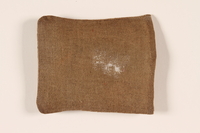
Brown burlap pouch used to carry money by a hidden Dutch Jewish woman
Object
Small burlap pouch used by Flora Cohen to store Dutch currency while she was in hiding in Amersfoort, Netherlands, from June 1942 to May 1945. Flora intended to send it to her mother Alijda, but Flora could not find her, so she always kept the pouch with her. Flora's mother Alidja had been deported to Auschwitz in September where she was killed. Flory met Felix Levi, a refugee from Hitler's Germany, in the mid-1930s. After Germany invaded Poland, Felix convinced Flora to flee. In November 1939, they sailed for South America aboard the SS Simon Bolivar, which was sunk by German mines. They were rescued by the British military and taken to a hospital in England. After recuperating for six months, they had to leave because Felix, a German, was considered an enemy alien. In May 1940, Germany invaded the Netherlands. Flora and Felix went into hiding in June 1942 in the home of Piet Brandsen, a resistance member. They married while in hiding. After Piet was arrested in January 1944, they found refuge with Hank Hornsveld and family. The Netherlands was liberated in May 1945. The couple emigrated to America in 1948 on the SS Nieuw Amsterdam.
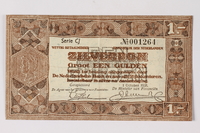
Netherlands, 1 gulden silver voucher, kept by a Dutch Jewish woman in hiding
Object
Dutch 1 (een) gulden note kept by Flory Cohen Levi in her pouch, see 1990.23.191, while she was in hiding in Amersfoort, Netherlands, from June 1942 to May 1945. Flora intended to send it to her mother Alijda, but Flora could not find her, so she always kept the pouch with her. Flora's mother Alidja had been deported to Auschwitz in September where she was killed. Flory met Felix Levi, a refugee from Hitler's Germany, in the mid-1930s. After Germany invaded Poland, Felix convinced Flora to flee. In November 1939, they sailed for South America aboard the SS Simon Bolivar, which was sunk by German mines. They were rescued by the British military and taken to a hospital in England. After recuperating for six months, they had to leave because Felix, a German, was considered an enemy alien. In May 1940, Germany invaded the Netherlands. Flora and Felix went into hiding in June 1942 in the home of Piet Brandsen, a resistance member. They married while in hiding. After Piet was arrested in January 1944, they found refuge with Hank Hornsveld and family. The Netherlands was liberated in May 1945. The couple emigrated to America in 1948 on the SS Nieuw Amsterdam.
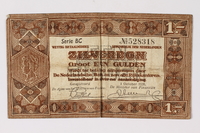
Netherlands, 1 gulden silver voucher, kept by a Dutch Jewish woman in hiding
Object
Dutch 1 (een) gulden silver voucher kept by Flory Cohen Levi in her pouch, see 1990.23.191, while she was in hiding in Amersfoort, Netherlands, from June 1942 to May 1945. Flora intended to send it to her mother Alijda, but Flora could not find her, so she always kept the pouch with her. Flora's mother Alidja had been deported to Auschwitz in September where she was killed. Flory met Felix Levi, a refugee from Hitler's Germany, in the mid-1930s. After Germany invaded Poland, Felix convinced Flora to flee. In November 1939, they sailed for South America aboard the SS Simon Bolivar, which was sunk by German mines. They were rescued by the British military and taken to a hospital in England. After recuperating for six months, they had to leave because Felix, a German, was considered an enemy alien. In May 1940, Germany invaded the Netherlands. Flora and Felix went into hiding in June 1942 in the home of Piet Brandsen, a resistance member. They married while in hiding. After Piet was arrested in January 1944, they found refuge with Hank Hornsveld and family. The Netherlands was liberated in May 1945. The couple emigrated to America in 1948 on the SS Nieuw Amsterdam.
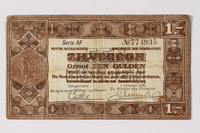
Netherlands, 1 gulden silver voucher, kept by a Dutch Jewish woman in hiding
Object
Dutch 1 (een) gulden silver voucher kept by Flory Cohen Levi in her pouch, see 1990.23.191, while she was in hiding in Amersfoort, Netherlands, from June 1942 to May 1945. Flora intended to send it to her mother Alijda, but Flora could not find her, so she always kept the pouch with her. Flora's mother Alidja had been deported to Auschwitz in September where she was killed. Flory met Felix Levi, a refugee from Hitler's Germany, in the mid-1930s. After Germany invaded Poland, Felix convinced Flora to flee. In November 1939, they sailed for South America aboard the SS Simon Bolivar, which was sunk by German mines. They were rescued by the British military and taken to a hospital in England. After recuperating for six months, they had to leave because Felix, a German, was considered an enemy alien. In May 1940, Germany invaded the Netherlands. Flora and Felix went into hiding in June 1942 in the home of Piet Brandsen, a resistance member. They married while in hiding. After Piet was arrested in January 1944, they found refuge with Hank Hornsveld and family. The Netherlands was liberated in May 1945. The couple emigrated to America in 1948 on the SS Nieuw Amsterdam.
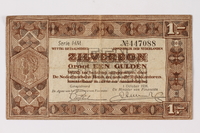
Netherlands, 1 gulden silver voucher, kept by a Dutch Jewish woman in hiding
Object
Dutch 1 (een) gulden silver voucher kept by Flory Cohen Levi in her pouch, see 1990.23.191, while she was in hiding in Amersfoort, Netherlands, from June 1942 to May 1945. Flora intended to send it to her mother Alijda, but Flora could not find her, so she always kept the pouch with her. Flora's mother Alidja had been deported to Auschwitz in September where she was killed. Flory met Felix Levi, a refugee from Hitler's Germany, in the mid-1930s. After Germany invaded Poland, Felix convinced Flora to flee. In November 1939, they sailed for South America aboard the SS Simon Bolivar, which was sunk by German mines. They were rescued by the British military and taken to a hospital in England. After recuperating for six months, they had to leave because Felix, a German, was considered an enemy alien. In May 1940, Germany invaded the Netherlands. Flora and Felix went into hiding in June 1942 in the home of Piet Brandsen, a resistance member. They married while in hiding. After Piet was arrested in January 1944, they found refuge with Hank Hornsveld and family. The Netherlands was liberated in May 1945. The couple emigrated to America in 1948 on the SS Nieuw Amsterdam.
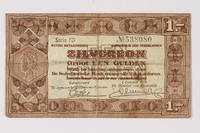
Netherlands, 1 gulden silver voucher, kept by a Dutch Jewish woman in hiding
Object
Dutch 1 (een) gulden silver voucher kept by Flory Cohen Levi in her pouch, see 1990.23.191, while she was in hiding in Amersfoort, Netherlands, from June 1942 to May 1945. Flora intended to send it to her mother Alijda, but Flora could not find her, so she always kept the pouch with her. Flora's mother Alidja had been deported to Auschwitz in September where she was killed. Flory met Felix Levi, a refugee from Hitler's Germany, in the mid-1930s. After Germany invaded Poland, Felix convinced Flora to flee. In November 1939, they sailed for South America aboard the SS Simon Bolivar, which was sunk by German mines. They were rescued by the British military and taken to a hospital in England. After recuperating for six months, they had to leave because Felix, a German, was considered an enemy alien. In May 1940, Germany invaded the Netherlands. Flora and Felix went into hiding in June 1942 in the home of Piet Brandsen, a resistance member. They married while in hiding. After Piet was arrested in January 1944, they found refuge with Hank Hornsveld and family. The Netherlands was liberated in May 1945. The couple emigrated to America in 1948 on the SS Nieuw Amsterdam.
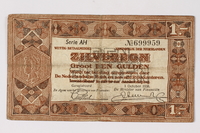
Netherlands, 1 gulden silver voucher, kept by a Dutch Jewish woman in hiding
Object
Dutch 1 (een) gulden silver voucher kept by Flory Cohen Levi in her pouch, see 1990.23.191, while she was in hiding in Amersfoort, Netherlands, from June 1942 to May 1945. Flora intended to send it to her mother Alijda, but Flora could not find her, so she always kept the pouch with her. Flora's mother Alidja had been deported to Auschwitz in September where she was killed. Flory met Felix Levi, a refugee from Hitler's Germany, in the mid-1930s. After Germany invaded Poland, Felix convinced Flora to flee. In November 1939, they sailed for South America aboard the SS Simon Bolivar, which was sunk by German mines. They were rescued by the British military and taken to a hospital in England. After recuperating for six months, they had to leave because Felix, a German, was considered an enemy alien. In May 1940, Germany invaded the Netherlands. Flora and Felix went into hiding in June 1942 in the home of Piet Brandsen, a resistance member. They married while in hiding. After Piet was arrested in January 1944, they found refuge with Hank Hornsveld and family. The Netherlands was liberated in May 1945. The couple emigrated to America in 1948 on the SS Nieuw Amsterdam.
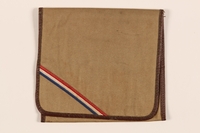
Brown cloth bag with a red, white, and blue stripe carried by a hidden Dutch Jewish woman
Object
Brown bag with a Dutch flag stripe used by Flora Cohen to store her false papers while she was in hiding in Amersfoort, Netherlands, from June 1942 to May 1945. Flory met Felix Levi, a refugee from Hitler's Germany, in the mid-1930s. After Germany invaded Poland, Felix convinced Flora to flee. In November 1939, they sailed for South America aboard the SS Simon Bolivar, which was sunk by German mines. They were rescued by the British military and taken to a hospital in England. After recuperating for six months, they had to leave because Felix, a German, was considered an enemy alien. In May 1940, Germany invaded the Netherlands. Flora and Felix went into hiding in June 1942 in the home of Piet Brandsen, a resistance member. They married while in hiding. In September 1942, Flora's mother Alijda was deported to Auschwitz, where she was killed. After Piet was arrested in January 1944, they found refuge with Hank Hornsveld and family. The Netherlands was liberated in May 1945. The couple emigrated to America in 1948 on the SS Nieuw Amsterdam.
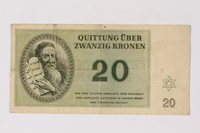
Theresienstadt ghetto-labor camp scrip, 20 kronen note
Object
Theresienstadt scrip, valued at 20 (zwanzig) kronen, acquired by Flory Cohen Levi, who survived in hiding in her native Netherlands during the war. This type of scrip was distributed in Theresienstadt (Terezin) ghetto-labor camp from May 1943-April 1945 in German occupied Czechoslovakia. Flory met Felix Levi, a refugee from Hitler's Germany, in the mid-1930s. After Germany invaded Poland, Felix convinced Flora to flee. In November 1939, they sailed for South America aboard the SS Simon Bolivar, which was sunk by German mines. They were rescued by the British military and taken to a hospital in England. After recuperating for six months, they had to leave because Felix, a German, was considered an enemy alien. In May 1940, Germany invaded the Netherlands. Flora and Felix went into hiding in June 1942 in the home of Piet Brandsen, a resistance member. They married while in hiding. In September 1942, Flora's mother Alijda was deported to Auschwitz, where she was killed. After Piet was arrested in January 1944, they found refuge with Hank Hornsveld and family. The Netherlands was liberated in May 1945. The couple emigrated to America in 1948 on the SS Nieuw Amsterdam.
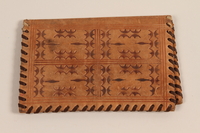
Geometric patterned leather wallet made by a Dutch Jewish couple in hiding
Object
Geometric patterned brown leather wallet made by Flora and Felix Levi while they were in hiding in Amersfoort, Netherlands, from June 1942 to May 1945. Flory Cohen met Felix Levi, a refugee from Hitler's Germany, in the mid-1930s. After Germany invaded Poland, Felix convinced Flora to flee. In November 1939, they sailed for South America aboard the SS Simon Bolivar, which was sunk by German mines. They were rescued by the British military and taken to a hospital in England. After recuperating for six months, they had to leave because Felix, a German, was considered an enemy alien. In May 1940, Germany invaded the Netherlands. Flora and Felix went into hiding in June 1942 in the home of Piet Brandsen, a resistance member. They married while in hiding. In September 1942, Flora's mother Alijda was deported to Auschwitz, where she was killed. After Piet was arrested in January 1944, they found refuge with Hank Hornsveld and family. The Netherlands was liberated in May 1945. The couple emigrated to America in 1948 on the SS Nieuw Amsterdam.
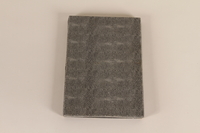
Black and white patterned case for medals awarded postwar to a Dutch resistance leader
Object
Fitted case for a set of 6 medals issued to Piet Brandsen by Stichting 1940-1945 for his bravery and resistance activities during the German occupation of the Netherlands from May 1940-May 1945. Stichting 1940-1945 was a foundation created during the war to provide aid to resistance members and their families. After Netherlands was invaded by Germany in May 1940, Piet and his wife Dina, devout Christians, joined the resistance. Piet helped many Jewish people go into hiding, in his own home and with other resistance members. He also provided false identities and food coupons. He was arrested by the Gestapo on January 21, 1944. He was jailed, often in solitary confinement, and was tortured and starved. He gave up no information and was released for lack of evidence after nine months, and continued his resistance work. After Piet passed away in 1978, his medals were given to Felix and Flory Van Beek, a Jewish couple that Piet and Dina hid, so the Van Beeks could donate them to a Jewish museum. Piet found Flora crying on the street and convinced her to go into hiding in his home. He found her boyfriend Felix and married the couple so they could live together in hiding. After Piet's arrest, they hid with Hank Hornsveld and family. The Netherlands was liberated in May 1945.
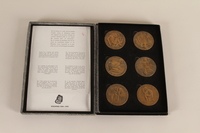
Award certificate issued postwar with 6 medals to a Dutch resistance leader
Object
Certificate for a set of 6 medals issued to Piet Brandsen by Stichting 1940-1945 for his bravery and resistance activities during the German occupation of the Netherlands from May 1940-May 1945. Stichting 1940-1945 was a foundation created during the war to provide aid to resistance members and their families. After Netherlands was invaded by Germany in May 1940, Piet and his wife Dina, devout Christians, joined the resistance. Piet helped many Jewish people go into hiding, in his own home and with other resistance members. He also provided false identities and food coupons. He was arrested by the Gestapo on January 21, 1944. He was jailed, often in solitary confinement, and was tortured and starved. He gave up no information and was released for lack of evidence after nine months, and continued his resistance work. After Piet passed away in 1978, his medals were given to Felix and Flory Van Beek, a Jewish couple that Piet and Dina hid, so the Van Beeks could donate them to a Jewish museum. Piet found Flora crying on the street and convinced her to go into hiding in his home. He found her boyfriend Felix and married the couple so they could live together in hiding. After Piet's arrest, they hid with Hank Hornsveld and family. The Netherlands was liberated in May 1945.
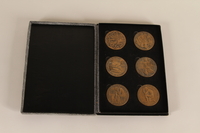
Medal honoring soldiers killed during the invasion issued to a Dutch resistance leader
Object
Medal honoring soldiers who died in the May 1940 invasion, with shield and broken sword, awarded to Piet Brandsen by Stichting 1940-1945 for his bravery and resistance activities during the German occupation of the Netherlands from May 1940-May 1945. The six medals in the series honor the following: 1. For the soldiers who fell in the May 1940 invasion [this medal, 1990.23.240.3]; 2. For those who endured the bombardments and attacks (1990.23.240.3; 3. For victims of torture and betrayal (1990.23.240.3]; 4. For those who suffered in the concentration camps (1990.23.240.3; 5. For those who were imprisoned (1990.23.240.3; 6. For all of those who have been oppressed by tyranny (1990.23.240.3. Stichting 1940-1945 foundation was created during the war to provide aid to resistance members and their families. After Netherlands was invaded by Germany in May 1940, Piet and his wife Dina, devout Christians, joined the resistance. Piet helped many Jewish people go into hiding and provided false identities and food coupons. He was arrested by the Gestapo on January 21, 1944. He was jailed, often in solitary, and was tortured and starved. He gave up nothing and was released for lack of evidence after nine months. He resumed his resistance work. After Piet passed away in 1978, his medals were given to Felix and Flory Van Beek, a Jewish couple hidden by Piet and Dina, so the Van Beeks could donate them to a Jewish museum. In June 1942, Piet found Flora crying on the street and convinced her to come hide in his home. He found her boyfriend Felix and married the couple so they could live together in hiding. After Piet's arrest, they hid with Hank Hornsveld and family. The Netherlands was liberated in May 1945.
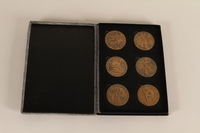
Commemorative medal issued to a Dutch resistance leader
Object
Commemorative medal, one of six, awarded to Piet Brandsen by Stichting 1940-1945 for his bravery and resistance activities during the German occupation of the Netherlands from May 1940-May 1945. Stichting 1940-1945 was a foundation created during the war to provide aid to resistance members and their families. After Netherlands was invaded by Germany in May 1940, Piet and his wife Dina, devout Christians, joined the resistance. Piet helped many Jewish people go into hiding, in his own home and with other resistance members. He also provided false identities and food coupons. He was arrested by the Gestapo on January 21, 1944. He was jailed, often in solitary confinement, and was tortured and starved. He gave up no information and was released for lack of evidence after nine months, and continued his resistance work. After Piet passed away in 1978, his medals were given to Felix and Flory Van Beek, a Jewish couple that Piet and Dina hid, so the Van Beeks could donate them to a Jewish museum. Piet found Flora crying on the street and convinced her to go into hiding in his home. He found her boyfriend Felix and married the couple so they could live together in hiding. After Piet's arrest, they hid with Hank Hornsveld and family. The Netherlands was liberated in May 1945.
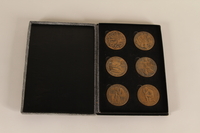
Commemorative medal issued to a Dutch resistance leader
Object
Commemorative medal, one of six, awarded to Piet Brandsen by Stichting 1940-1945 for his bravery and resistance activities during the German occupation of the Netherlands from May 1940-May 1945. Stichting 1940-1945 was a foundation created during the war to provide aid to resistance members and their families. After Netherlands was invaded by Germany in May 1940, Piet and his wife Dina, devout Christians, joined the resistance. Piet helped many Jewish people go into hiding, in his own home and with other resistance members. He also provided false identities and food coupons. He was arrested by the Gestapo on January 21, 1944. He was jailed, often in solitary confinement, and was tortured and starved. He gave up no information and was released for lack of evidence after nine months, and continued his resistance work. After Piet passed away in 1978, his medals were given to Felix and Flory Van Beek, a Jewish couple that Piet and Dina hid, so the Van Beeks could donate them to a Jewish museum. Piet found Flora crying on the street and convinced her to go into hiding in his home. He found her boyfriend Felix and married the couple so they could live together in hiding. After Piet's arrest, they hid with Hank Hornsveld and family. The Netherlands was liberated in May 1945.
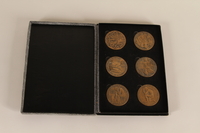
Commemorative medal issued to a Dutch resistance leader
Object
Commemorative medal, one of six, awarded to Piet Brandsen by Stichting 1940-1945 for his bravery and resistance activities during the German occupation of the Netherlands from May 1940-May 1945. Stichting 1940-1945 was a foundation created during the war to provide aid to resistance members and their families. After Netherlands was invaded by Germany in May 1940, Piet and his wife Dina, devout Christians, joined the resistance. Piet helped many Jewish people go into hiding, in his own home and with other resistance members. He also provided false identities and food coupons. He was arrested by the Gestapo on January 21, 1944. He was jailed, often in solitary confinement, and was tortured and starved. He gave up no information and was released for lack of evidence after nine months, and continued his resistance work. After Piet passed away in 1978, his medals were given to Felix and Flory Van Beek, a Jewish couple that Piet and Dina hid, so the Van Beeks could donate them to a Jewish museum. Piet found Flora crying on the street and convinced her to go into hiding in his home. He found her boyfriend Felix and married the couple so they could live together in hiding. After Piet's arrest, they hid with Hank Hornsveld and family. The Netherlands was liberated in May 1945.
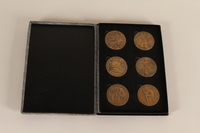
Commemorative medal issued to a Dutch resistance leader
Object
Commemorative medal, one of six, awarded to Piet Brandsen by Stichting 1940-1945 for his bravery and resistance activities during the German occupation of the Netherlands from May 1940-May 1945. Stichting 1940-1945 was a foundation created during the war to provide aid to resistance members and their families. After Netherlands was invaded by Germany in May 1940, Piet and his wife Dina, devout Christians, joined the resistance. Piet helped many Jewish people go into hiding, in his own home and with other resistance members. He also provided false identities and food coupons. He was arrested by the Gestapo on January 21, 1944. He was jailed, often in solitary confinement, and was tortured and starved. He gave up no information and was released for lack of evidence after nine months, and continued his resistance work. After Piet passed away in 1978, his medals were given to Felix and Flory Van Beek, a Jewish couple that Piet and Dina hid, so the Van Beeks could donate them to a Jewish museum. Piet found Flora crying on the street and convinced her to go into hiding in his home. He found her boyfriend Felix and married the couple so they could live together in hiding. After Piet's arrest, they hid with Hank Hornsveld and family. The Netherlands was liberated in May 1945.
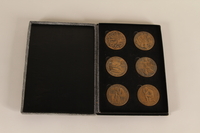
Commemorative medal issued to a Dutch resistance leader
Object
Commemorative medal, one of six, awarded to Piet Brandsen by Stichting 1940-1945 for his bravery and resistance activities during the German occupation of the Netherlands from May 1940-May 1945. Stichting 1940-1945 was a foundation created during the war to provide aid to resistance members and their families. After Netherlands was invaded by Germany in May 1940, Piet and his wife Dina, devout Christians, joined the resistance. Piet helped many Jewish people go into hiding, in his own home and with other resistance members. He also provided false identities and food coupons. He was arrested by the Gestapo on January 21, 1944. He was jailed, often in solitary confinement, and was tortured and starved. He gave up no information and was released for lack of evidence after nine months, and continued his resistance work. After Piet passed away in 1978, his medals were given to Felix and Flory Van Beek, a Jewish couple that Piet and Dina hid, so the Van Beeks could donate them to a Jewish museum. Piet found Flora crying on the street and convinced her to go into hiding in his home. He found her boyfriend Felix and married the couple so they could live together in hiding. After Piet's arrest, they hid with Hank Hornsveld and family. The Netherlands was liberated in May 1945.

Netherlands, 1 gulden silver voucher, kept by a Dutch Jewish woman in hiding
Object
Dutch 1 (een) gulden silver voucher kept by Flory Cohen Levi in her pouch, see 1990.23.191, while she was in hiding in Amersfoort, Netherlands, from June 1942 to May 1945. Flora intended to send it to her mother Alijda, but Flora could not find her, so she always kept the pouch with her. Flora's mother Alidja had been deported to Auschwitz in September where she was killed. Flory met Felix Levi, a refugee from Hitler's Germany, in the mid-1930s. After Germany invaded Poland, Felix convinced Flora to flee. In November 1939, they sailed for South America aboard the SS Simon Bolivar, which was sunk by German mines. They were rescued by the British military and taken to a hospital in England. After recuperating for six months, they had to leave because Felix, a German, was considered an enemy alien. In May 1940, Germany invaded the Netherlands. Flora and Felix went into hiding in June 1942 in the home of Piet Brandsen, a resistance member. They married while in hiding. After Piet was arrested in January 1944, they found refuge with Hank Hornsveld and family. The Netherlands was liberated in May 1945. The couple emigrated to America in 1948 on the SS Nieuw Amsterdam.



